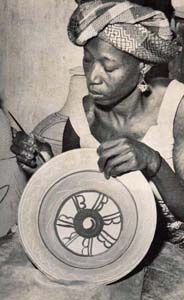Ladi Kwali | |
|---|---|
 Ladi Kwali | |
| Born | Ladi Kwali 1925 |
| Died | 12 August 1984 (aged 58–59) |
| Occupation | potter |
Ladi Kwali or Ladi Dosei Kwali, OON NNOM, MBE (c. 1925 – 12 August 1984)[1] was a Nigerian potter, ceramicist and educator.[2]
Ladi Kwali was born in the village of Kwali in the Gwari region of Northern Nigeria, where pottery was an indigenous occupation among women.[3] She learned pottery as a child through her aunt, using the traditional method of coiling. She made large pots for use as water jars, cooking pots, bowls, and flasks from coils of clay, beaten from the inside with a flat wooden paddle. They were decorated with incised geometric and stylized figurative patterns, including scorpions, lizards, crocodiles, chameleons, snakes, birds, and fish.[4]
Her pots were noted for their beauty of form and decoration, and she was recognized regionally as a gifted and eminent potter.[5] Several were acquired by the emir of Abuja, Alhaji Suleiman Barau,[6] in whose home they were seen by Michael Cardew in 1950.
- ^ Awa, Omiko (6 December 2020). "Ladi Dosei Kwali, a legendary pacesetter". The Guardian. Retrieved 10 August 2021.
- ^ "Ladi Kwali". AWARE Women artists / Femmes artistes. Retrieved 7 July 2024.
- ^ Vincentelli, Moira (2000). Women and Ceramics: Gendered Vessels. Manchester, UK: Manchester University Press. pp. 58–76. ISBN 978-0719038402.
- ^ Cardew, Michael (April 1972). "Ladi Kwali: The Potter from England Writes on the Potter from Africa". Craft Horizons (32): 34–37.
- ^ Thompson, Barbara (6 February 2007). "Namsifueli Nyeki: A Tanzanian Potter Extraordinaire". African Arts. 40 (1): 54–63. doi:10.1162/afar.2007.40.1.54. ISSN 0001-9933. S2CID 57571884.
- ^ "History of Ladi Kwali, the Famous Nigerian Potter". Abuja Facts. 8 February 2015. Archived from the original on 7 January 2016. Retrieved 18 January 2016.